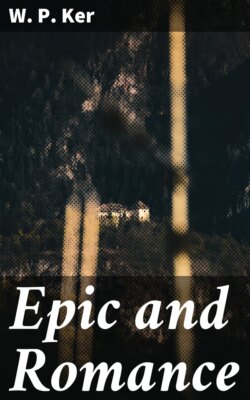Читать книгу Epic and Romance - W. P. Ker - Страница 49
На сайте Литреса книга снята с продажи.
ROMANCE AND THE OLD FRENCH ROMANTIC SCHOOLS
ОглавлениеTable of Contents
| Romance an element in Epic and Tragedy apart from all "romantic schools" | 321 |
| The literary movements of the twelfth century | 322 |
| A new beginning | 323 |
| The Romantic School unromantic in its methods | 324 |
| Professional Romance | 325 |
| Characteristics of the school—courteous sentiment | 328 |
| Decorative passages—descriptions—pedantry | 329 |
| Instances from Roman de Troie and from Ider, etc. | 330 331 |
| Romantic adventures—the "matter of Rome" and the "matter of Britain" | 334 |
| Blending of classical and Celtic influences—e.g. in Benoit's Medea | 334 |
| Methods of narrative—simple, as in the Lay of Guingamor; overloaded, as in Walewein | 337 |
| Guingamor | 338 |
| Walewein, a popular tale disguised as a chivalrous romance | 340 |
| The different versions of Libeaux Desconus—one of them is sophisticated | 343 |
| Tristram—the Anglo-Norman poems comparatively simple and ingenuous | 344 |
| French Romance and Provençal Lyric | 345 |
| Ovid in the Middle Ages—the Art of Love | 346 |
| The Heroines | 347 |
| Benoit's Medea again | 348 |
| Chrestien of Troyes, his place at the beginning of modern literature | 349 |
| 'Enlightenment' in the Romantic School | 350 |
| The sophists of Romance—the rhetoric of sentiment and passion | 351 |
| The progress of Romance from medieval to modern literature | 352 |
| Chrestien of Troyes, his inconsistencies—nature and convention | 352 |
| Departure from conventional romance; Chrestien's Enid | 355 |
| Chrestien's Cliges—"sensibility" | 357 |
| Flamenca, a Provençal story of the thirteenth century—the author a follower of Chrestien | 359 |
| His acquaintance with romantic literature and rejection of the "machinery" of adventures | 360 360 |
| Flamenca, an appropriation of Ovid—disappearance of romantic mythology | 361 |
| The Lady of Vergi, a short tragic story without false rhetoric | 362 |
| Use of medieval themes by the great poets of the fourteenth century | 363 |
| Boccaccio and Chaucer—the Teseide and the Knight's Tale | 364 |
| Variety of Chaucer's methods | 364 |
| Want of art in the Man of Law's Tale | 365 |
| The abstract point of honour (Clerk's Tale, Franklin's Tale) | 366 |
| Pathos in the Legend of Good Women | 366 |
| Romantic method perfect in the Knight's Tale | 366 |
| Anelida, the abstract form of romance | 367 |
| In Troilus and Criseyde the form of medieval romance is filled out with strong dramatic imagination | 367 |
| Romance obtains the freedom of Epic, without the old local and national limitations of Epic | 368 |
| Conclusion | 370 |
